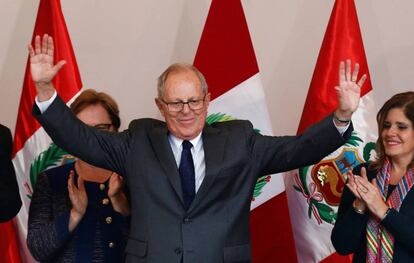Peru election authorities name Kuczynski the winner
PPK secured 50.12% of the vote compared with 49.88% for Fujimori, who refuses to admit defeat

Four days into the vote count, Peru’s electoral office ONPE announced that Pedro Pablo Kuczynki of Peruanos por el Kambio (Peruvians for Change) is the winner with 50.12% of the vote, followed by Popular Force leader Keiko Fujimori with 49.88%.
The economist and former investment banker secured 8,580,474 votes compared with 8,539,036 for the daughter of ex-president Alberto Fujimori, who is currently in prison for corruption and human rights violations.
It was a thin margin of victory representing just 41,438 votes, or just under a quarter of a percentage point. There are still a few disputed votes left to tally, but not enough to alter the outcome.
Nobody knows who the incoming government belongs to, but at least we do know who Congress belongs to
Congressman Pedro Espadaro
“We are going to work really hard. There’s just a little bit left [until the full vote count],” said Kuczynsky outside his home.
Known in Peru by his initials PPK, the winner of an extremely tight election had been delaying his victory speech until 100% of the votes were officially accounted for, but on Thursday he finally spoke out.
“They say that I am old; it’s true, but my noggin and my experience are still serving me well. And if anything happens to me, I have two insurance policies: Martincito and Mechita,” said the 77-year-old Kuczynski, addressing rumors about his health.
Power transfer begins
The individuals he was alluding to are his two vice-presidents, Martín Vizcarra and Mercedes Aráoz, who have already begun managing the power transfer from the outgoing administration of Ollanta Humala.
A tough ending for Humala
Peruvian president Ollanta Humala will leave office in July with his popularity ratings at an all-time low, and a prosecutor’s request not to let First Lady Nadine Heredia leave the country. Heredia, president of the Nationalist Party, is being investigated for campaign funding in 2006 and 2011, when her husband was running for office. Heredia’s brother, who served as party treasurer, is also under scrutiny. Humala has criticized the prosecutors’ decision because “it hurts Peru’s image.”
On Thursday, Aráoz told the local daily Gestión that the first items on the new administration’s agenda will be the fight against street crime and reactivating the economy.
“What’s coming now is reconciliation, jobs, dialogue. PPK is a leader who likes to talk, there is an open space to discuss the best options for national growth, poverty reduction and improved education,” said Aráoz, an economist who served as economy and industry minister under Alan García. Until December, she was also the Peru representative at the Inter-American Development Bank, and negotiated the last portion of the free trade agreement with the United States, which she defended against a popular strike in 2009 to protest changes in land laws.
Vizcarra is a civil engineer who presided over the Moquegua region between 2011 and 2014, placing it in top spot for educational achievement. He is defined by those who know him as a great negotiator. Outgoing president Ollanta Humala twice asked him to be his prime minister. In 2012 he unblocked a mining project known as Quellaveco and owned by Anglo American, which was being held back by local opposition.
Fujimori still resisting
Meanwhile, Keiko Fujimori refuses to accept defeat even though the vote count has reached 99.95% and the difference between her and PPK can no longer be bridged.
“We are waiting patiently,” said the 41-year-old former congresswoman, who ran on a similar economic platform but promised to be tougher on crime.
Despite her defeat, Fujimori will retain control over 73 members of Congress, compared with just 18 for PPK, which could make the new president’s mandate a complicated one if deals are not reached.
On Wednesday, Popular Force congressman Pedro Espadaro noted that “nobody knows who the incoming government belongs to, but at least we do know who Congress belongs to.”
English version by Susana Urra.
Tu suscripción se está usando en otro dispositivo
¿Quieres añadir otro usuario a tu suscripción?
Si continúas leyendo en este dispositivo, no se podrá leer en el otro.
FlechaTu suscripción se está usando en otro dispositivo y solo puedes acceder a EL PAÍS desde un dispositivo a la vez.
Si quieres compartir tu cuenta, cambia tu suscripción a la modalidad Premium, así podrás añadir otro usuario. Cada uno accederá con su propia cuenta de email, lo que os permitirá personalizar vuestra experiencia en EL PAÍS.
¿Tienes una suscripción de empresa? Accede aquí para contratar más cuentas.
En el caso de no saber quién está usando tu cuenta, te recomendamos cambiar tu contraseña aquí.
Si decides continuar compartiendo tu cuenta, este mensaje se mostrará en tu dispositivo y en el de la otra persona que está usando tu cuenta de forma indefinida, afectando a tu experiencia de lectura. Puedes consultar aquí los términos y condiciones de la suscripción digital.








































